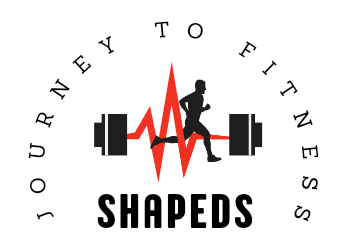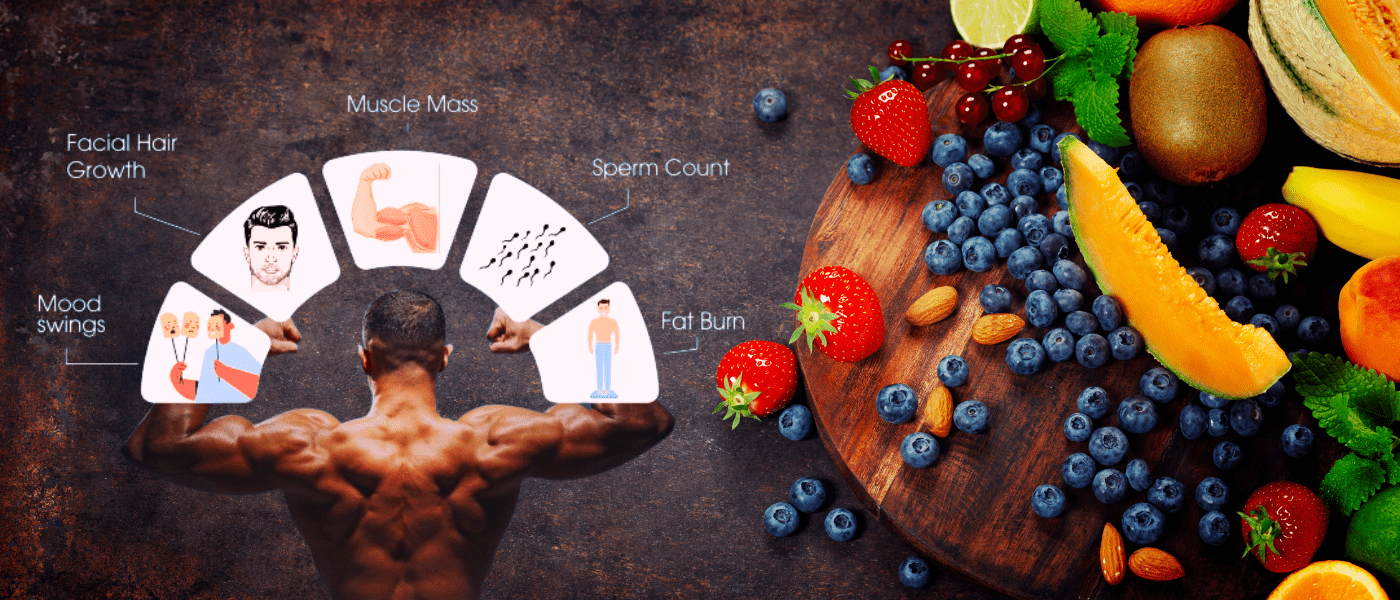Testosterone, often associated with masculinity, plays a crucial role in various bodily functions, including muscle development, bone density, and overall vitality. As we age, testosterone levels tend to decline, impacting our energy levels and overall well-being. While there are various ways to address this decline, one often overlooked approach is through dietary choices. In this article, we’ll explore the world of fruits that serve as nature’s boost to testosterone levels.
Why Testosterone Matters

Before exploring into the specifics of testosterone-boosting fruits, let’s understand why testosterone matters. This hormone, mainly found in males but present in females as well, influences muscle mass, bone density, and the production of red blood cells. Low testosterone levels can lead to fatigue, reduced libido, and even mood swings.
Natural Ways to Boost Testosterone
In the quest for a vibrant and energetic life, maintaining optimal testosterone levels is crucial. While there are various synthetic options available, embracing natural methods not only ensures sustainability but also promotes overall health. Let’s delve into the natural ways you can boost testosterone, focusing on the power of fruits.
A Balanced Diet is Key
The foundation of testosterone health lies in maintaining a balanced diet. Ensure your meals include a mix of macronutrients, including proteins, healthy fats, and carbohydrates. A well-rounded diet provides the essential building blocks for hormonal balance.
Exercise Regularly for Hormonal Harmony
Regular physical activity is a cornerstone for overall health, and it significantly impacts testosterone levels. Engaging in both cardiovascular exercises and strength training promotes hormonal harmony, contributing to enhanced vitality.
Fruits: The Natural Testosterone Boosters
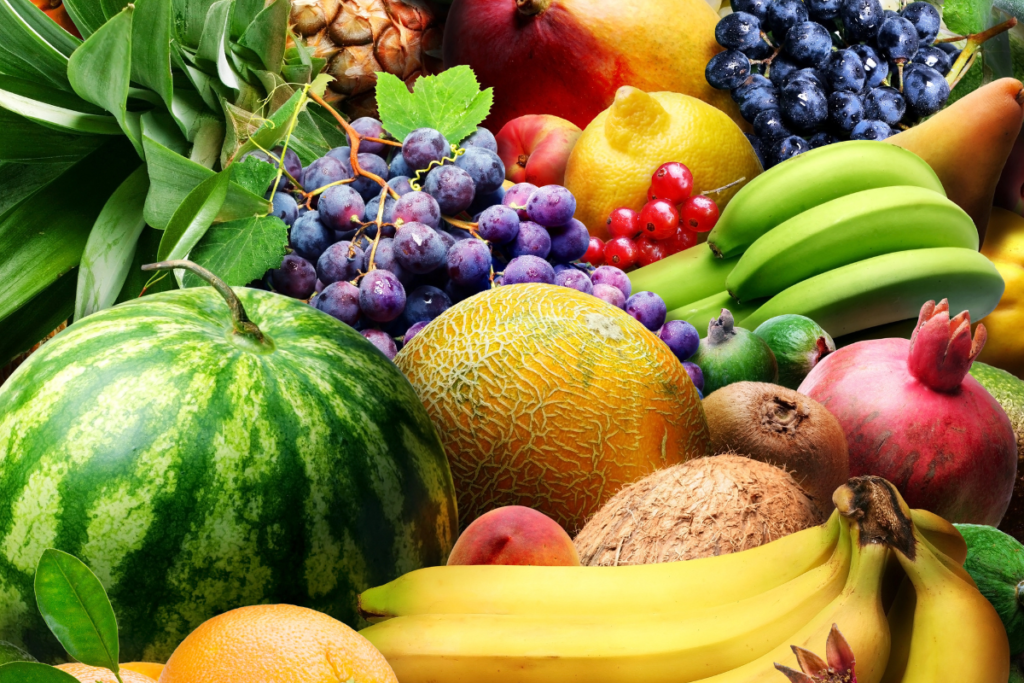
Among the innumerable of dietary choices, fruits emerge as unsung heroes in boosting testosterone levels naturally. Fruits, often celebrated for their vitamins and antioxidants, also house nutrients that support testosterone production. Let’s explore some fruits that stand out in this regard.
Pomegranates: The Powerhouse of Testosterone
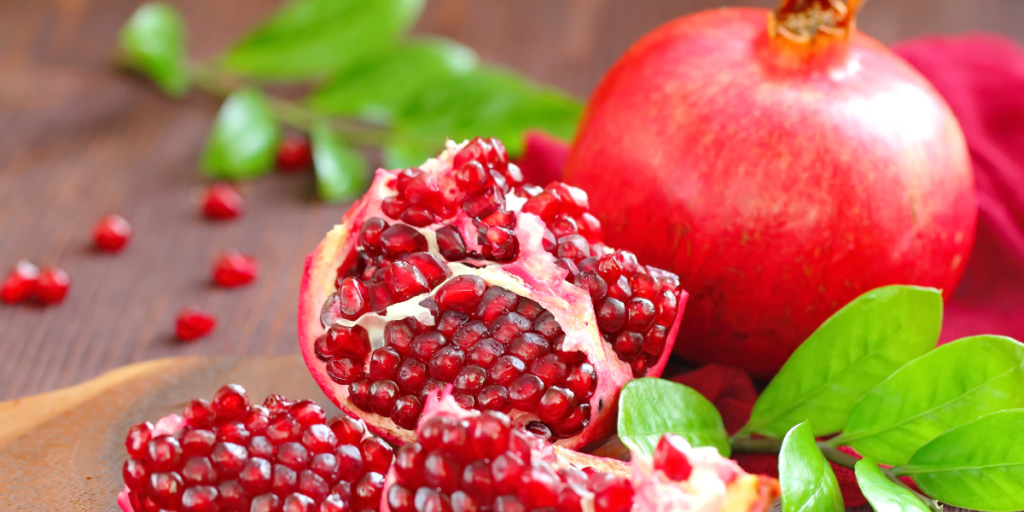
Pomegranates, with their juicy seeds, are not just a delightful snack but also a powerhouse of nutrients. Rich in antioxidants, pomegranates have been linked to increased testosterone levels in various studies.
Pomegranates Nutrition Facts
Pomegranates, with their burst of flavor and vibrant arils, offer a treasure trove of nutrition:
- Antioxidant Richness: Packed with punicalagins and anthocyanins, pomegranates are potent antioxidants, safeguarding cells.
- Vitamins Galore: Abundant in vitamin C for immune support and vitamin K for blood clotting, contributing to overall health.
- Mineral Bounty: Pomegranates contain essential minerals like potassium, promoting heart health and maintaining blood pressure.
- Dietary Fiber Source: A good source of dietary fiber, aiding digestion and supporting a healthy gut.
- Natural Sweetness: Beyond nutrition, the arils provide a deliciously sweet and tart taste, making pomegranates a delightful addition to your diet.
Savor the goodness of pomegranates as they contribute to your overall well-being.
Bananas: More than Just a Snack
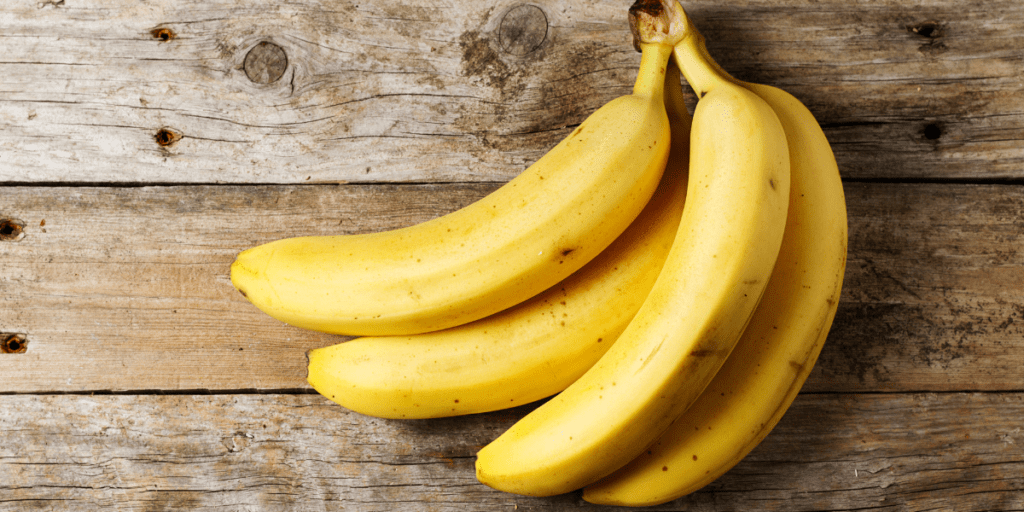
Beyond being a convenient snack, bananas are packed with nutrients that contribute to testosterone production. Incorporating bananas into your daily routine can provide a natural boost.
Bananas Nutrition Facts
Bananas, the convenient and tasty yellow fruit, offer a wealth of nutritional benefits:
- Rich in Potassium: An excellent source of potassium, bananas support heart health and help regulate blood pressure.
- Vitamins A and C: Bananas provide essential vitamins, contributing to skin health (vitamin A) and immune support (vitamin C).
- Natural Energy Boost: Packed with carbohydrates, bananas are a quick and natural energy source, making them an ideal snack.
- Dietary Fiber: High in dietary fiber, bananas aid digestion and promote a healthy gut.
- Heart-Healthy Nutrients: With minimal fat content and zero cholesterol, bananas contribute to a heart-healthy diet.
- Bromelain Content: Bromelain, an enzyme found in bananas, may contribute to testosterone production, supporting hormonal balance.
Incorporate bananas into your diet for a tasty and nutritious way to support overall health, including testosterone levels.
Avocado: The Healthy Fat Source
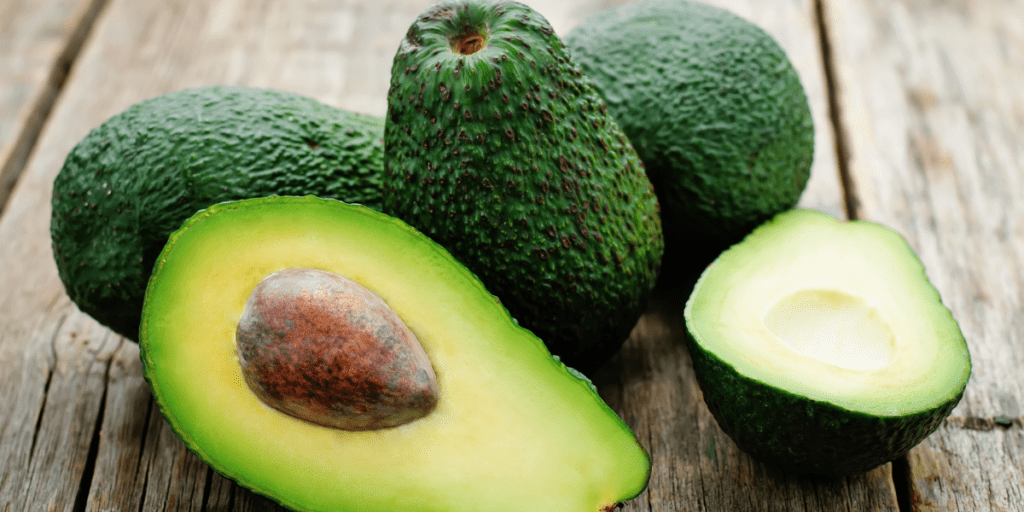
Essential for hormone production, including testosterone, healthy fats play a pivotal role in the body’s hormonal balance. Avocados, known for their monounsaturated fats, serve as an excellent addition to support overall hormonal health.
Avocado Nutrition Facts and Hormonal Support
Avocados, the creamy delights, offer more than just great taste – they can support hormonal balance, including testosterone:
- Healthy Fats: Rich in monounsaturated fats, avocados contribute to heart health and are crucial for hormone production, including testosterone.
- Vitamin Variety: Loaded with vitamins K, C, E, and B vitamins, avocados play a role in immune support, skin health, and overall well-being.
- Potassium Boost: Avocados are a potassium-rich food, aiding in blood pressure regulation and supporting proper muscle function.
- Dietary Fiber Source: With high dietary fiber content, avocados contribute to digestive health and help maintain a feeling of fullness.
- Hormone Support: The healthy fats in avocados provide a foundation for hormone production, making them a valuable addition to a diet aimed at supporting testosterone levels.
Enjoy the goodness of avocados not only for their rich flavor but also for their contribution to hormonal health.
Citrus Fruits: Vitamin C for Testosterone
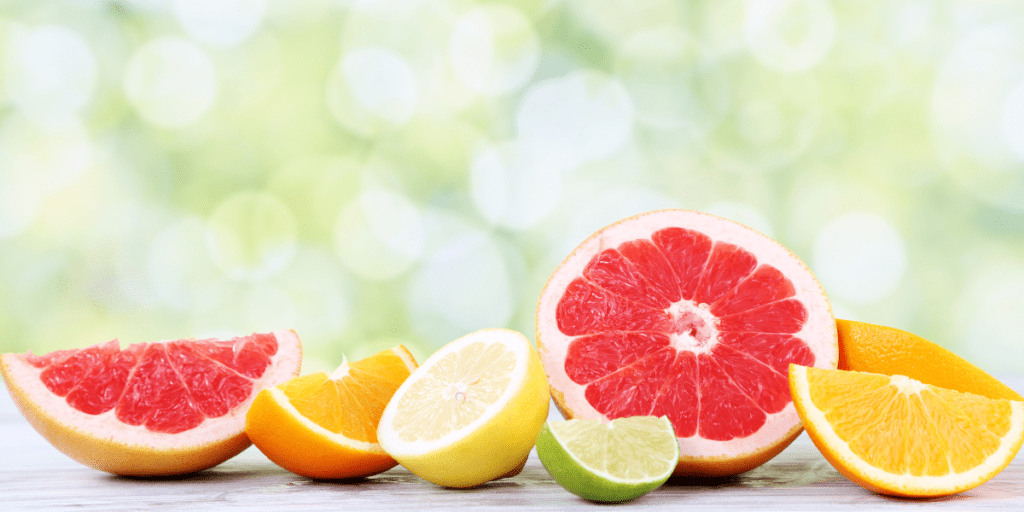
Vitamin C is essential for testosterone synthesis, and citrus fruits are known for their high vitamin C content. Oranges, lemons, and grapefruits can be valuable additions to your diet.
Grapes: Resveratrol and Testosterone

Grapes contain resveratrol, a compound associated with numerous health benefits, including increased testosterone levels. Adding grapes to your diet can offer a tasty way to support hormonal balance.
Grapes Nutrition Facts and Hormonal Harmony
Grapes, those juicy clusters, offer a spectrum of nutritional benefits and may contribute to hormonal balance, including testosterone:
- Resveratrol Richness: Grapes, especially red grapes, contain resveratrol, a compound associated with potential benefits for testosterone levels and overall health.
- Vitamin Variety: Packed with vitamins C and K, grapes support immune function, blood clotting, and contribute to overall well-being.
- Mineral Bounty: Grapes provide essential minerals like potassium, supporting heart health and maintaining blood pressure.
- Antioxidant Power: Loaded with antioxidants, grapes protect cells from oxidative stress, creating a favorable environment for hormonal harmony.
- Hydration Component: With high water content, grapes contribute to overall hydration, supporting bodily functions, including hormonal regulation.
Incorporate grapes into your diet for a sweet and nutritious way to support your overall health, potentially including hormonal balance.
Watermelon: Beyond Refreshment
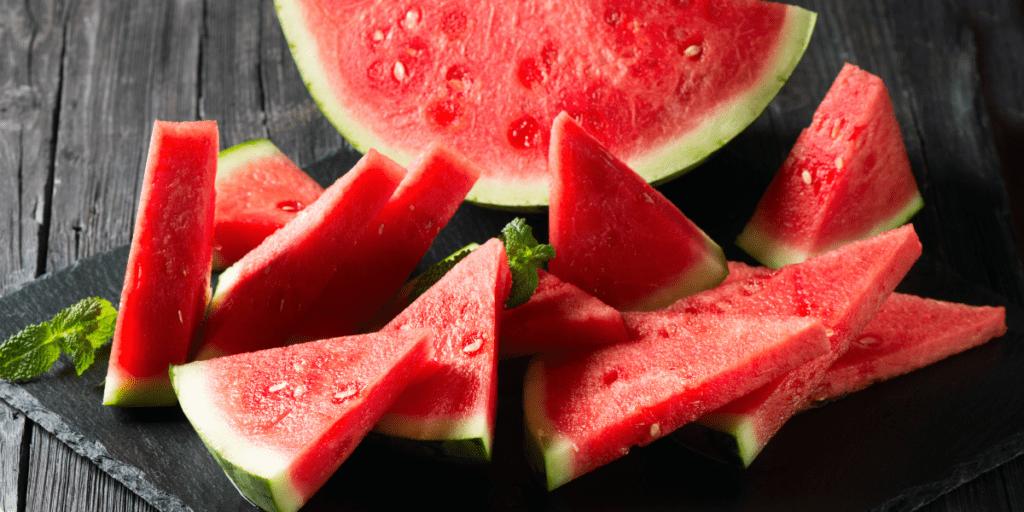
Apart from being a refreshing treat, watermelon contains citrulline, an amino acid linked to enhanced blood flow and, indirectly, testosterone production. Enjoying watermelon can be a delicious way to boost vitality.
Watermelon Nutrition Facts and Hormonal Support
Watermelon, the juicy summertime favorite, not only refreshes but also offers nutritional benefits that may support hormonal balance, including testosterone:
- Hydration Hero: With about 92% water content, watermelon keeps you hydrated, supporting overall bodily functions, including hormonal regulation.
- Vitamin C Boost: Rich in vitamin C, watermelon contributes to immune function and provides antioxidant benefits.
- Amino Acid Citrulline: Watermelon contains citrulline, an amino acid associated with improved blood flow, potentially supporting cardiovascular health and hormonal balance.
- Low in Calories: Being low in calories, watermelon is a guilt-free option, making it suitable for those watching their weight, a factor that can indirectly affect hormonal health.
- Natural Sweetness: The natural sugars in watermelon provide a deliciously sweet taste, offering a healthy alternative to sugary snacks.
Enjoy the refreshing and hydrating benefits of watermelon, possibly contributing to your overall well-being, including hormonal health.
Strawberries: Antioxidants for Testosterone
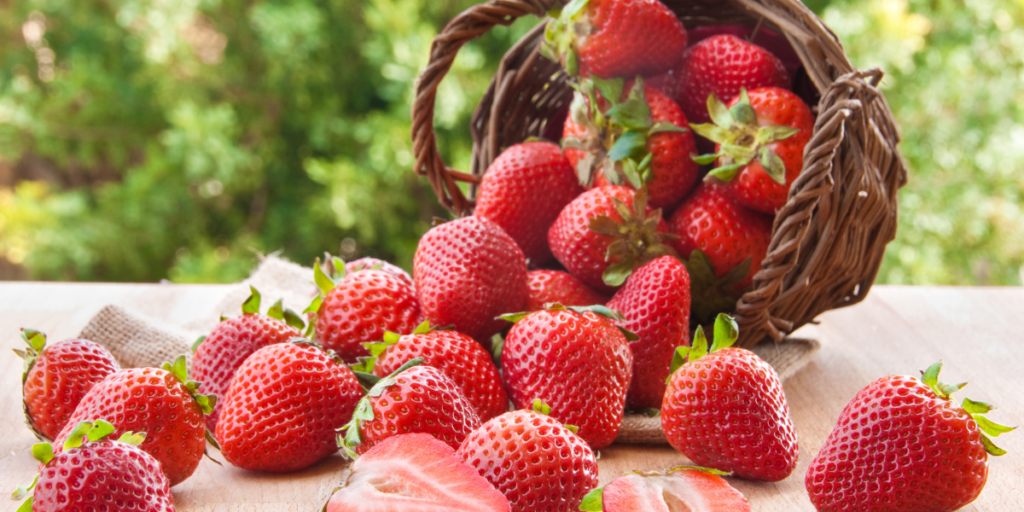
Strawberries, rich in antioxidants, contribute to overall health, including hormonal balance. Incorporating these vibrant berries into your diet can be a flavorful and health-conscious choice.
Strawberries Nutrition Facts and Hormonal Support
Strawberries, those vibrant red gems, bring not only delightful flavor but also nutritional benefits that may contribute to hormonal support, including testosterone:
- Antioxidant Power: Rich in antioxidants like anthocyanins, strawberries protect cells from oxidative stress, potentially creating a favorable environment for hormonal balance.
- Vitamin C Boost: Strawberries are an excellent source of vitamin C, supporting immune function and providing antioxidant benefits that may indirectly impact hormonal health.
- Fiber-Rich Goodness: High in dietary fiber, strawberries promote digestion, support gut health, and help maintain overall well-being, factors that can influence hormonal balance.
- Low-Calorie Snack: With relatively low calories, strawberries offer a guilt-free and nutritious snack option, contributing to overall health.
- Anti-Inflammatory Properties: Certain compounds in strawberries have anti-inflammatory effects, potentially benefiting conditions related to inflammation, which may indirectly impact hormonal balance.
Savor the sweet and tangy flavor of strawberries while enjoying the potential hormonal support they bring.
Apples: Fiber and Testosterone
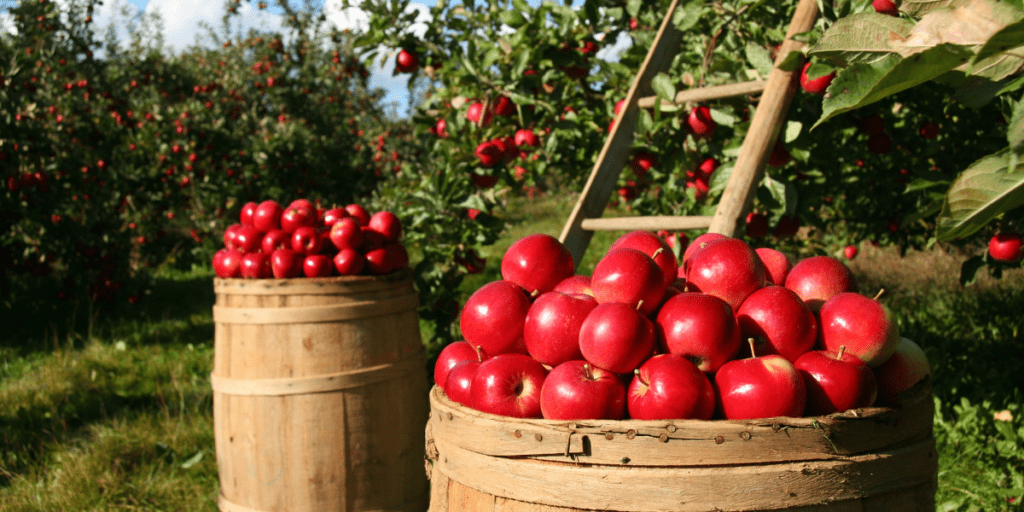
Fiber plays a role in regulating hormones, and apples are a fantastic source of dietary fiber. Snacking on apples can contribute to hormonal harmony.
Apples Nutrition Facts and Hormonal Harmony
Apples, those crisp and sweet delights, not only make for a tasty snack but also offer nutritional benefits that may contribute to hormonal harmony, including testosterone:
- Dietary Fiber Source: Apples are rich in fiber, promoting digestion, supporting gut health, and potentially influencing hormonal balance indirectly.
- Vitamin C Boost: Providing a dose of vitamin C, apples support immune function and provide antioxidant benefits that may have an impact on overall well-being.
- Natural Sugars: The natural sugars in apples offer a healthier alternative to processed sweets, supporting a balanced diet that can positively influence hormonal health.
- Hydration Component: Apples contain water, contributing to overall hydration, which is essential for various bodily functions, including hormonal regulation.
- Heart-Healthy Compounds: Certain compounds in apples may contribute to heart health, supporting overall cardiovascular well-being and indirectly influencing hormonal balance.
Incorporate apples into your daily routine for a delicious and nutritious way to potentially support hormonal health.
Blueberries: Testosterone-Boosting Berries
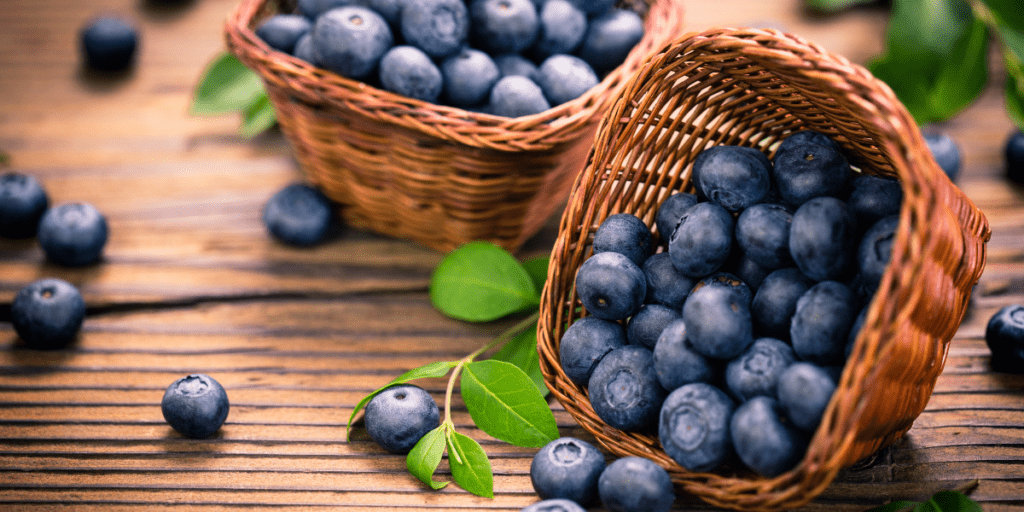
Blueberries, known for their antioxidant properties, offer a range of nutrients that support general well-being, including testosterone health.
Blueberries Nutrition Facts and Hormonal Health
Blueberries, those tiny bursts of flavor, offer more than just a delightful taste—they bring nutritional benefits that may contribute to hormonal health, including testosterone:
- Antioxidant Richness: Packed with antioxidants, especially anthocyanins, blueberries protect cells from oxidative stress, creating a conducive environment for hormonal balance.
- Vitamin C Boost: Blueberries are an excellent source of vitamin C, supporting immune function and providing antioxidant benefits that may indirectly impact hormonal health.
- Dietary Fiber Content: With a significant fiber content, blueberries aid digestion, support gut health, and may influence hormonal balance through their impact on overall well-being.
- Rich in Nutrients: Blueberries offer essential nutrients like manganese, contributing to bone health and nutrient metabolism, which can play a role in hormonal health.
- Anti-Inflammatory Properties: Certain compounds in blueberries have anti-inflammatory effects, potentially benefiting conditions related to inflammation and, indirectly, hormonal balance.
Indulge in the delicious goodness of blueberries for a flavorful and potentially hormonally supportive addition to your diet.
Cherries: Melatonin and Testosterone
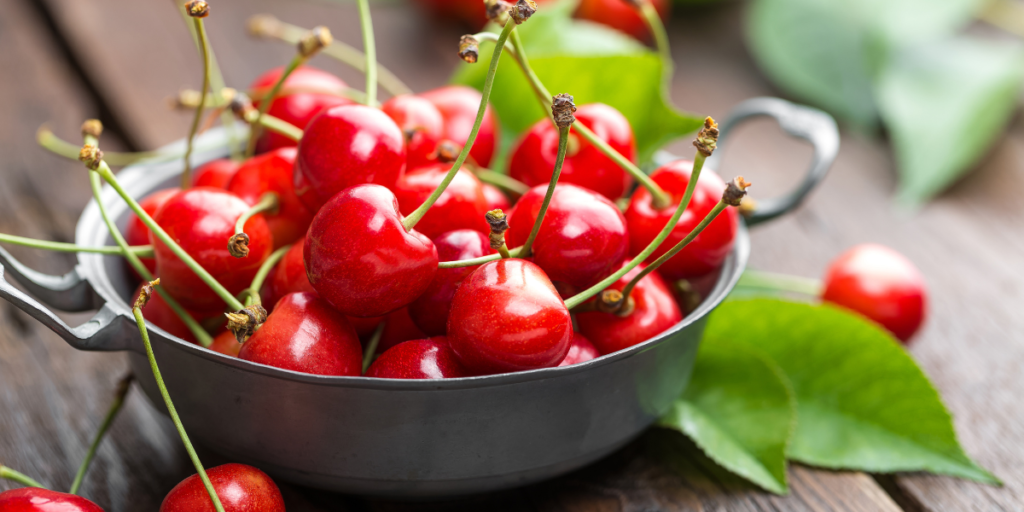
Cherries contain melatonin, a hormone that aids in quality sleep. Improved sleep indirectly supports healthy testosterone levels, making cherries a valuable addition to your diet.
Cherries Nutrition Facts and Hormonal Wellness
Cherries, those sweet and vibrant gems, offer more than just a burst of flavor—they bring nutritional benefits that may contribute to hormonal wellness, including testosterone:
- Antioxidant-Rich Delight: Cherries, particularly tart cherries, contain antioxidants, like anthocyanins, which protect cells and may create an environment supportive of hormonal balance.
- Melatonin Magic: Cherries naturally contain melatonin, a hormone associated with sleep regulation, which can indirectly impact overall hormonal health.
- Vitamin C Boost: With a generous dose of vitamin C, cherries support immune function and provide antioxidant benefits, potentially influencing hormonal well-being.
- Dietary Fiber Source: Cherries are high in dietary fiber, promoting digestion, supporting gut health, and contributing to overall well-being.
- Low-Calorie Sweetness: Being relatively low in calories, cherries offer a sweet and nutritious option, making them a guilt-free addition to a balanced diet that can positively influence hormonal health.
Enjoy the sweetness of cherries not just for their taste but also for their potential contribution to hormonal wellness.
Conclusion
Incorporating testosterone-boosting fruits into your daily diet can be a flavorful and enjoyable way to support hormonal health. From the antioxidant-rich strawberries to the testosterone-boosting powers of pomegranates, nature provides a diverse array of options. Remember, a holistic approach, combining a balanced diet with regular exercise, is key to maintaining optimal testosterone levels and overall well-being.
FAQs:
Q. Are there specific fruits that can lower testosterone levels?
While some fruits may not directly boost testosterone, none are known to lower levels when consumed as part of a balanced diet.
Q. How quickly can one expect to see results by incorporating these fruits into their diet?
Individual responses may vary, but noticeable changes in energy levels and well-being can often be observed within a few weeks.
Q. Can women benefit from incorporating testosterone-boosting fruits into their diet?
Absolutely! While women generally have lower testosterone levels than men, maintaining a healthy hormonal balance is crucial for overall well-being. The nutrient-rich fruits mentioned can contribute to hormonal harmony in both men and women.
Q. Are there any side effects to consuming testosterone-boosting fruits regularly?
In general, incorporating these fruits into a balanced diet is safe and comes with numerous health benefits.
Q. Can supplements replace the need for testosterone-boosting fruits?
While supplements may provide a concentrated source of certain nutrients, obtaining them from whole fruits ensures a broader spectrum of health benefits.
In conclusion, nature’s bounty offers a delicious and natural way to support testosterone levels. By making a conscious effort to include fruits rich in nutrients vital for hormonal health, you not only enhance your well-being but also indulge in delightful flavors and textures. Remember, the key lies in balance – a mix of nutritious foods, regular exercise, and adequate sleep contribute to an overall healthy lifestyle.
